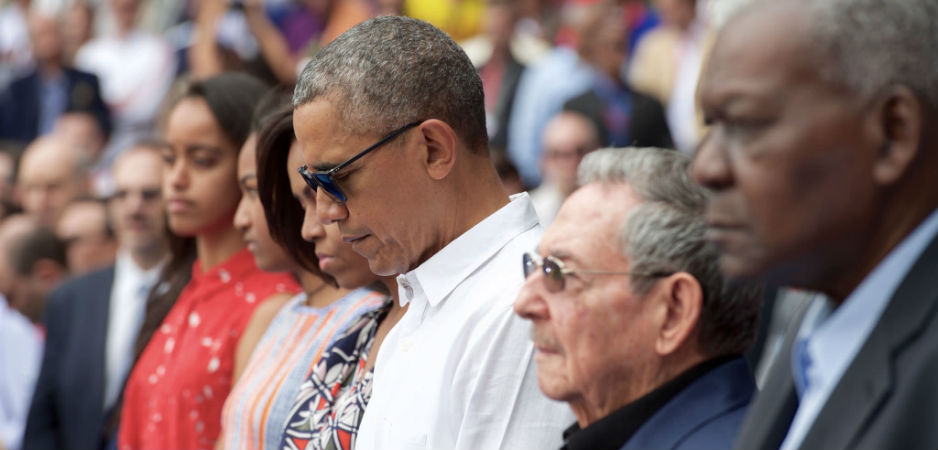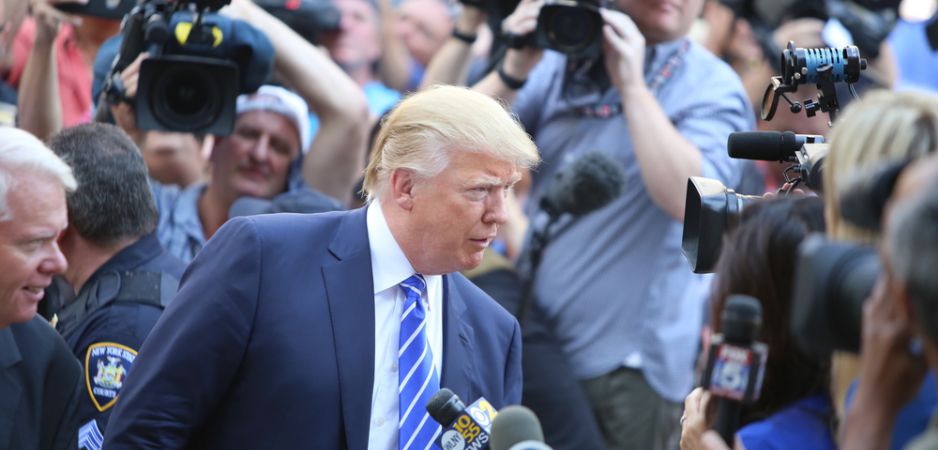President Obama makes history by traveling to Cuba and urging “the people of the Americas to leave behind the ideological battles of the past.”
After years of deep freeze that began with the Cold War, relations between Cuba and the United States are finally warming up. In fact, President Barack Obama visited Cuba to signal a historic shift in the relations between the two countries. Only once before has an American president visited Cuba. That was in 1928 when Calvin Coolidge turned up in Havana. In the US, the stock market was soaring, inequality was growing and alcohol was prohibited. Unsurprisingly, Americans flocked to Cuba to enjoy whiskey, rum and cocktails in a land where alcohol flowed freely.
Speaking at the Gran Teatro at Havana, Obama spoke emotively about burying the last remnant of the Cold War and extending “a hand of friendship to the Cuban people.” He candidly admitted that the change in US policy occurred because what his country “was doing was not working.” In the past, the Cuban Missile Crisis of 1962 nearly brought the world to the brink of nuclear war. Although there is no longer a threat of war, deep differences still remain between the two countries.
Yet the US and Cuba have a lot in common. As Obama pointed out, both countries were created in the New World as colonies of the Europeans. In fact, both their histories begin with Christopher Columbus. This Italian arrived in a Spanish-sponsored voyage to the New World, landing in the Bahamas and exploring a bit of Cuba. Columbus never made it to the land that now comprises the US even though Columbus Day is celebrated merrily in the land of the free and the home of the brave.
The arrival of Columbus was an unmitigated disaster for Cuban natives. The Papal Bull of 1493 commanded Spaniards to conquer the natives who had to be “brought to the faith itself” and gave their rulers absolute ownership of the Americas. Now, the Spanish conquistadores proceeded to butcher natives with a ferocity that makes modern African warlords appear like weak wallflowers. Slaughter, rape and robbery were par for the course.
Bartolomé de las Casas kept a contemporaneous record of the horrors that devout Christians inflicted on pagan natives. Guarionex was a “dutiful and virtuous” king who sent gourds filled with gold to Spain. When there was less gold available, he suggested cultivation of a large tract of land by his people that would give Spain an annual income of 3 million castilians, gold coins weighing 1.6 ounces. Instead of accepting Gaurionex’s offer, Spanish conquistadores raped his wife, attacked his people, captured him and packed him off on a ship to Castile.
Casas observed that the local people “behaved as honorably as might the inmates of a well-run monastery, and for this they were robbed and massacred, and even those who escaped death on this occasion found themselves condemned to a lifetime of captivity and slavery.” He recorded that the Spaniards “burned countless local inhabitants alive or hacked them to pieces, or devised novel ways of torturing them to death.”
The genocide of the natives was soon followed by bringing in African slaves to work in plantations. So far, colonization of Cuba mirrored that of British colonies in North America that went on to become the US. As Obama pithily said, both societies “trace their heritage to both slaves and slave-owners.”
President Obama did not and could not expand upon the historic differences between the two nations because he was giving a diplomatic speech. Cuba was run by Spain on the principles of mercantilism and Catholicism. North American colonies were influenced by British ideas of free trade and Protestantism. Unlike Cuba, they were loosely governed and largely had self-rule. Whilst Cuba produced its sugar for Spain, the North Americans were far more embedded into global trade.
After 1776, the US emerged as an independent nation. Cuba remained a colony that loyally served the Spanish Empire till 1868. Only then did a vigorous independence movement begin. Obama paid tribute to José Martí who fled to New York and became an apostle of independence. Martí was killed by the Spanish in 1895, but his death inspired rebellion instead of submission.
Even reconcentrados, Spanish forerunners to modern-day concentration camps, could not break the Cuban spirit. Eventually, the US intervened in 1898. It sent troops to fight Spain. Some volunteered to fight such as the legendary “Rough Riders” led by Theodore Roosevelt. To use Obama’s words again, the US came to liberate but it also wanted to exert control.
Many expansionists dreamt of incorporating Cuba into the US and they managed to get their government to try to buy it from Spain. These attempts did not succeed, but the US retained the right to intervene in Cuban affairs even after the country attained independence in 1902. To quote Obama one final time, “Americans saw Cuba as something to exploit, ignored poverty [and] enabled corruption.”
In retrospect, revolution was inevitable. Cuba was a deeply exploitative society run rapaciously by the descendants of conquistadores. This lily-white comprador elite served the interests of American multinationals, politicians and even members of the mafia instead of serving its people. Yet when the revolution arrived in 1959, it caught everyone by surprise.
By now, Uncle Sam had overthrown Iranian Prime Minister Mohammad Mosaddegh in a coup in 1953. It had backed the brutal British repression of the Mau Mau Revolt in Kenya. Joseph McCarthy had conducted witch hunts in which he saw a communist under every bush. For a communist uprising to succeed barely 90 miles from Florida was terrifying to US leaders. Presidents from Dwight D. Eisenhower and John F. Kennedy to Bill Clinton and George W. Bush tried to demonize Cuba.
The US has managed to strangle the Cuban economy like a boa constrictor but has been unable to swallow its prey. Cubans have managed to survive the US-imposed embargoes. They may drive antique cars and their buildings might be crumbling, but their education and health care systems are the envy of richer economies. Cuban doctors have served Brazil, Venezuela, West Africa and other parts of the world. Even the US has come to grudgingly admire the quality of Cuban doctors.
The Cuban Revolution of 1959 has iconic status in world history. It occurred because far too many were exploited for much too long. Fidel Castro and Che Guevara became global cult figures because they stood up to a country that practiced segregation at home and supported apartheid abroad. Over five decades have passed and the revolution has racked up some solid achievements. Cubans have food on their table, decent schools to study in and good doctors to go to. As per the World Bank, poor Cubans live as long if not longer than their rich American counterparts.
 Yet all is not well in this communist paradise. The regime is repressive. Critics end up in jail. The press is muzzled. Young people chafe against restrictions on their daily lives. Raúl Castro has taken over from his brother and he is a sprightly 84-year-old. One party rules the roost and there is no opposition worth the name. Many Cubans vote with their feet and still immigrate to the US.
Yet all is not well in this communist paradise. The regime is repressive. Critics end up in jail. The press is muzzled. Young people chafe against restrictions on their daily lives. Raúl Castro has taken over from his brother and he is a sprightly 84-year-old. One party rules the roost and there is no opposition worth the name. Many Cubans vote with their feet and still immigrate to the US.
The US is in thick soup itself. Inequality is rising. Public education is declining. Social mobility is falling. The role of money in elections is scandalous. Many Americans are angry. Donald Trump and Ted Cruz do not make edifying examples of American democracy. The new enemies of Uncle Sam are in the Middle East and even the Far East. Continuing a ding-dong skirmish with Cuba no longer makes sense. After concluding a deal with Iran, Obama has turned up in Havana to salsa with Castro.
The US and Cuba come from two very different histories and ideologies. They are both facing fundamental questions regarding government, economics and society. Cuba has embraced Karl Marx’s theories with zeal even as the US has adopted market fundamentalism as its guiding principle. Gautam Buddha, better known as the Buddha, once stressed upon the middle way as the path of wisdom. Bit by bit, Cuba and the US seem to be getting there.
*[You can receive “The World This Week” directly in your inbox by subscribing to our mailing list. Simply visit Fair Observer and enter your email address in the space provided. Meanwhile, please find below five of our finest articles for the week.]
In a Region of Division, Nowruz Brings Unity
The Persian New Year, celebrated by diverse ethnic groups around the world, is a time to reflect and reconcile.
The Middle East sits on a keg of gunpowder. Sectarian tensions, armed conflicts, violent extremism and foreign intervention continue to undermine the security of a region long coveted for its energy resources and geopolitical importance.
Looking at the larger picture of regional developments, one can conclude that the Middle East is in dire need of peace and reconciliation before the worrying crises send it spiraling out of control. Even though the situation is so tense, the rest of the world cannot claim that it is impervious to the challenges and woes of the turbulent neighborhood.
In a region marred by division and conflict, there is a unifying festival that has the potential to bind nations closer together and purge their hostility and bitterness: Nowruz. Literally meaning “new day,” Nowruz is the ancient Persian New Year festival celebrated by over… Read more
Migrants Need Access to Health Care
The migrant crisis will impede our ability to deliver Sustainable Development Goals for 2030.
Post-2015, officials of the United Nations (UN) and other stakeholders started to think carefully about what development meant in this new era. Breaking down perceptions beyond extreme poverty or maternal health is still crucially important, but as a global development community, we acknowledged that development is achieved by thinking big. Peace, governance and reducing inequality, for instance, all affect levels of poverty, so it is important to work toward these goals.
Migration is not excluded within this. It is recognized as both an important contributor to development and also a hindrance, if non-regular migrants are not adequately empowered. What was not banked on was the new wave of migration that is currently being experienced—the “crisis” within a sizeable bloc of the developed Western world.
The waves of migrants fleeing war zones in search of new areas where they can attain basic needs like… Read more
Republican Plan for Destroying ISIS
The next president’s first priority when it comes to defeating the Islamic State is to avoid making more strategic errors.
The Republican presidential candidates have been the originators of some provocative sound bites in reference to battling the Islamic State (IS—also referred to as ISIS or ISIL), including talk about “carpet bombing,” “waterboarding,” banning Muslims from entering the United States, and creating agencies for the promotion of Judeo-Christian values. With the possibility that one may be elected president in November, their proposed strategies for continuing President Barack Obama’s Operation Inherent Resolve deserve a closer look. After all, this is the campaign that former Secretary of Defense Leon Panetta described as possibly a “30 year war.”
The race for the Grand Old Party’s (GOP) nomination has dwindled from an impressive starting bench of 17 candidates to just three: Ted Cruz, John Kasich and Donald Trump. With 17 Republican primaries to go over the next three months, here is… Read more
Roger Casement: Remembering a Forgotten Hero
Roger Casement spent his life fighting for the oppressed, but died isolated and reviled by many because of his sexuality.
I walk past the Tower of London remembering the sea of red poppies that flowed over its walls last year in commemoration of the millions of lives lost in the First World War a hundred years ago.
Another precious life was also lost then, a true hero of the struggle against the brutality of colonialism, imperialism, enslavement and cruelty. A man who used all his skills and energy to highlight the suffering of the people of the Congo and Peru, a man who took up the fight against the colonialization of his own people, a hero of the Irish struggle for self-determination, a man who was executed despite his critical role as a true humanitarian, whose reputation was destroyed because he was said to love other men—the last man ever to be imprisoned in the Tower of London… Read more
Why a Brexit Could Sink the EU
The UK referendum could have serious but not calamitous economic effects on the nation over the long-term. The bigger worry is that an exit by one country might lead others to follow.
On June 23, the British people will vote on a historical referendum on whether they want the United Kingdom to stay in the European Union (EU). Just what the economic impact will be is hard to assess, say Wharton experts, because no nation has ever left the 28-member economic and political bloc.
“No one knows what the economic impact will be” and most analysis “is just speculation at this stage,” says Wharton Finance Professor Joao Gomes. “There are no firm studies. There is no hard data.” What’s more, it is the political consequences that may have the biggest impact on the EU’s future, at least in the short- and medium-term because should one nation leave the group, others could follow. Specifically, the UK’s referendum will determine… Read more
The views expressed in this article are the author’s own and do not necessarily reflect Fair Observer’s editorial policy.
Photo Credit: US Department of State
 We bring you perspectives from around the world. Help us to inform and educate. Your donation is tax-deductible. Join over 400 people to become a donor or you could choose to be a sponsor.
We bring you perspectives from around the world. Help us to inform and educate. Your donation is tax-deductible. Join over 400 people to become a donor or you could choose to be a sponsor.
Support Fair Observer
We rely on your support for our independence, diversity and quality.
For more than 10 years, Fair Observer has been free, fair and independent. No billionaire owns us, no advertisers control us. We are a reader-supported nonprofit. Unlike many other publications, we keep our content free for readers regardless of where they live or whether they can afford to pay. We have no paywalls and no ads.
In the post-truth era of fake news, echo chambers and filter bubbles, we publish a plurality of perspectives from around the world. Anyone can publish with us, but everyone goes through a rigorous editorial process. So, you get fact-checked, well-reasoned content instead of noise.
We publish 2,500+ voices from 90+ countries. We also conduct education and training programs
on subjects ranging from digital media and journalism to writing and critical thinking. This
doesn’t come cheap. Servers, editors, trainers and web developers cost
money.
Please consider supporting us on a regular basis as a recurring donor or a
sustaining member.
Will you support FO’s journalism?
We rely on your support for our independence, diversity and quality.











